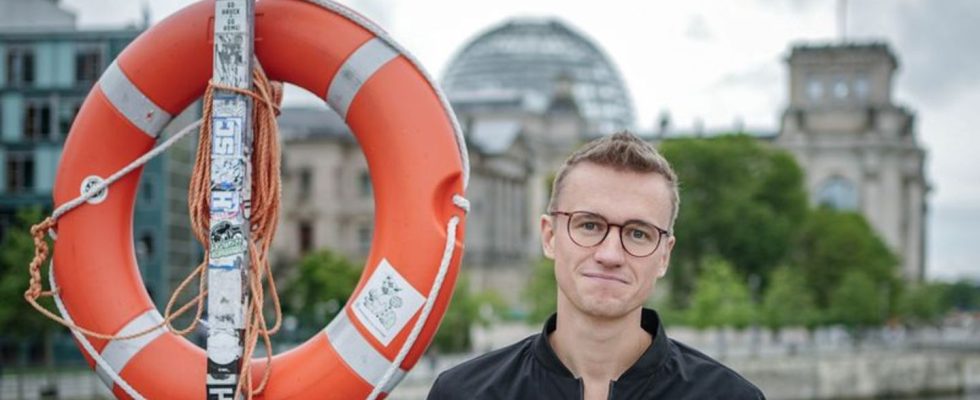The Green Julian Pahlke has brought his heartfelt issue into parliament: rescuing refugees from distress at sea. How does an activist feel when he suddenly has political responsibility?
It’s almost half time. On September 26, 2021, the Germans elected a new Bundestag. Two years later, the mood in the traffic light coalition made up of the SPD, Greens and FDP is no longer as cheerful as it was at the beginning, when the coalition partners gave their agreement for a joint government a lively title: “Dare to make more progress – alliance for freedom, justice and sustainability”.
The fact that the lightness and optimism have been lost a little is not only due to the Russian war of aggression against Ukraine. Even if, of course, many plans were thrown out the window because it suddenly became a matter of preventing a possible gas shortage, cushioning high energy prices and taking in more than a million war refugees.
His path into politics
One of those for whom everything was new back then is Julian Pahlke. The 31-year-old has not had a classic party youth career. He found his way into politics through his experiences as a crew member rescuing refugees at sea in the Mediterranean.
He only became a member of the Green Party in 2019. As a parental leave representative, Pahlke got an idea of what life is like for MPs in Berlin in the office of Minister of State for Culture Claudia Roth, who was then Vice President of the Bundestag.
The challenge of migration policy
Today, two years after his own start as a elected official under the Reichstag dome, Pahlke has the feeling that he can make a difference. However, the busy schedule and some of the compromises that his party has agreed with the coalition partners SPD and FDP are still causing him problems.
Especially when it comes to his heartfelt issue, migration policy and especially sea rescue. Especially since the pictures from the Italian island of Lampedusa that went around the world a few days ago remind him of the difficult hours at sea that he experienced in his mid-twenties before he entered politics.
“The pictures from Lampedusa actually only prove once again that the European asylum system is dysfunctional,” says Pahlke. The Italians would be right if they criticized the fact that a European distribution of refugees has not yet worked and that the current system places a particularly heavy burden on some states.
Pahlke privately
The MP with the black-framed glasses and springy step seems to be constantly under pressure. A photo taken of the plane hangs above the low sofa in Pahlke’s Bundestag office. A small ship and several inflatable boats can be seen on it. “I was here,” says Pahlke, pointing to one of the boats.
After studying, Pahlke worked in an advertising agency. His passion since childhood has been sailing, as well as any form of water sports. “I actually wanted to go to sea for three weeks and just help out on the ship for three weeks,” he says about his first rescue mission. But then the thing with the rescue ships didn’t let him go. He quit his job and became a board member at “Jugend Rettet”.
Regarding his experiences in the Mediterranean, especially on the one day when they couldn’t take everyone on board, he says: “That will stay with me for a long time.” He then had to take a break for four years and was no longer on the water.
He points to the picture above the sofa and says: “The fact that this picture is hanging here today is somehow a bit of a victory over myself and at the same time the motivation to continue doing this with all my might.”
Everyday life for MPs between hate and success
Like many politicians who deal with migration issues, he also received a lot of hate comments, confirms Pahlke. But it is not as bad as with prominent party colleagues, such as Green Party leader Ricarda Lang or Bavarian top candidate Katharina Schulze.
Pahlke counts one of the small successes in everyday life as a member of parliament as being that, together with others in the budget negotiations, he ensured that “we actually managed to get funding for sea rescue.” On the one hand, this is a contribution to the protection of human rights, “but of course also a great symbol.”
Together with other parliamentarians, he also wrote a cross-party letter to the Italian parliament, stating “that we view the legislation there, namely punishing civilian rescue ships if they carry out more than one rescue, as highly problematic.” He was also concerned about the details of the extension of the mandate for the Bundeswehr’s participation in the EU-led Operation “Irini” in the Mediterranean.
What he probably underestimated before his candidacy was the density of appointments and the amount of work, he admits. Pahlke says he believes that very few MPs work less than 80 or 90 hours during the weeks in session. “That’s the reality of life.” There is very little time left for private matters. He is happy to pay this price because his candidacy was a conscious decision, even if it is not always easy for him to forego meetings with friends or family.
Will he stay in politics?
When asked whether he would apply for a place on the Lower Saxony state list again before the next federal election, which – if the traffic light coalition does not break up – will be in autumn 2025, his answer is as non-committal as it is for long-time MPs Typical is: “I don’t see the need to decide right now. We’re just halfway there.” But perhaps he really doesn’t know yet whether the hamster wheel of the Bundestag, in which attention is the strongest currency, will remain his home in the long term.

